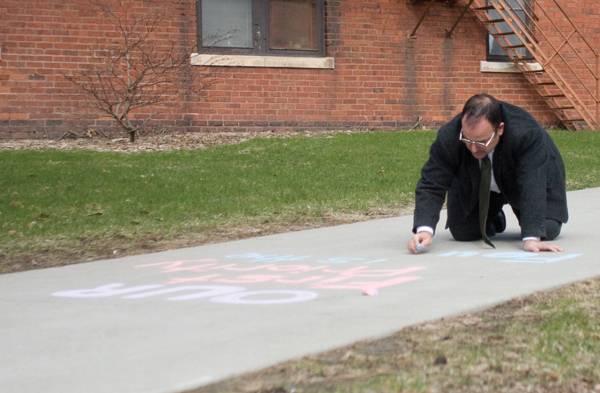PRELL: Talk the talk

Michael Bugeja, director of the Greenlee School of Journalism and Mass Communication, chalks the sidewalk Tuesday outside of Hamilton Hall, along with a number of students, in preparation for First Amendment Day. The First Amendment allows citizens freedom of speech; however, there are types of verbalizations that are regulated by the government. Photo: Gailyn Miller/Iowa State Daily
April 14, 2009
I think some people are stupid.
Harsh, crude and pointedly opinionated. I have no doubt that this statement will find itself tossed aside in the minds of most people, placed into that dark corner of the mind faster than you can say “OMG.”
But here’s the wonderful thing about that belief of mine: I have the opportunity and freedom to say it. The First Amendment allows me that privilege.
Taking full advantage of the freedom of speech privilege that the First Amendment allows me, I can say whatever is on my mind at any given moment. Or can I?
Freedom of speech is one of the most hotly debated topics of our time, although many do not realize it. I remember being very young and arguing with my cousin about a great many things.
“I have the right to say whatever I want,” he would tout. “It’s a free country!”
Well, yes and no. Certainly my cousin had and still has a wide breadth of what he is allowed to say, no matter how inane or idiotic it may be, as do all American citizens. But the freedom of speech is not absolute.
Obscenity, hate speech, pornography, libel and slander are a few things that are regulated by our government in regards to freedom of speech, and as a journalist, I can tell you that the latter two on that list are enforced rigidly. Additionally, speech is not free to be spoken anywhere at any time.
On Iowa State’s campus, for instance, we have what is known as a free speech zone. Here, demonstrators, protesters and the like may espouse their views without consequence. But why is the free speech zone there in the first place?
If we have true freedom of speech, shouldn’t we be able to speak up no matter the location? It need not be seen as polite or politically correct, but since when have the most powerful examples of free speech been given polite society’s approval?
You may have noticed earlier in this column I wrote the word “privilege” in regards to the freedom of speech. I wish to point out this is not a typo or synonym for “right.” Rights are an idea. Rights are a concept. And unfortunately, I cannot and will not bring myself to call the freedoms we are allowed “rights.”
The First Amendment states that Congress shall not abridge freedom of speech.
And yet I cannot cuss, I cannot supplement this column with erotica, I cannot be too offensive, and I have pre-determined times and places where I may exercise my speech rather than doing it whenever and wherever I wish. I’m not saying I have the desire to shout random obscenities and sexual references during Stat 101, but if my freedom is truly a right, shouldn’t I be able to?
And, that being said, I have one question for you: What do you want to talk about today?
— Sophie Prell is a junior in pre-journalism and mass communication from Alta.






